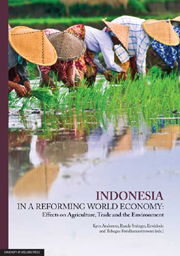Book contents
- Frontmatter
- Contents
- List of tables, figures and boxes
- FIGURES
- Acronyms
- Preface
- List of contributors
- 1 Introduction
- 2 Effects of growth, its interruption, and the Uruguay Round on Indonesian agriculture
- 3 Effects of AFTA and APEC trade policy reforms on Indonesian agriculture
- 4 Trade liberalisation and soil degradation in Indonesia
- 5 Will the Uruguay Round and APEC reforms harm air and water quality in Indonesia?
- 6 Impacts of agricultural protection growth at home and the WTO's Doha Round on Indonesian agriculture
- 7 Effects of agricultural policy reform on household and regional income distribution in Indonesia
- 8 Effects of farm policy reform on Indonesia's secondary food crops
- 9 Effects of agricultural policy reform in Indonesia on its food security and environment
- 10 Impacts of trade policy reform on income distribution and poverty in Indonesia
- APPENDIX 1 The WAYANG Model of the Indonesian economy
- APPENDIX 2 The GTAP Model and database
5 - Will the Uruguay Round and APEC reforms harm air and water quality in Indonesia?
Published online by Cambridge University Press: 05 June 2012
- Frontmatter
- Contents
- List of tables, figures and boxes
- FIGURES
- Acronyms
- Preface
- List of contributors
- 1 Introduction
- 2 Effects of growth, its interruption, and the Uruguay Round on Indonesian agriculture
- 3 Effects of AFTA and APEC trade policy reforms on Indonesian agriculture
- 4 Trade liberalisation and soil degradation in Indonesia
- 5 Will the Uruguay Round and APEC reforms harm air and water quality in Indonesia?
- 6 Impacts of agricultural protection growth at home and the WTO's Doha Round on Indonesian agriculture
- 7 Effects of agricultural policy reform on household and regional income distribution in Indonesia
- 8 Effects of farm policy reform on Indonesia's secondary food crops
- 9 Effects of agricultural policy reform in Indonesia on its food security and environment
- 10 Impacts of trade policy reform on income distribution and poverty in Indonesia
- APPENDIX 1 The WAYANG Model of the Indonesian economy
- APPENDIX 2 The GTAP Model and database
Summary
Most-favoured-nation (MFN) trade liberalisations will always improve global economic welfare even in the presence of environmental externalities, provided optimal environmental policies are in place (Anderson and Blackhurst 1992; Corden 1997, Ch. 13). However, where national environmental standards differ markedly between countries and international environmental spillovers are significant, globally optimal environmental policies will differ from nationally optimal ones. That, plus the fact that in many (especially developing) countries the enforcement of environmental policies is often less than optimal even from a national viewpoint, raises in some people's minds (e.g., Chichilnisky 1994) the question of whether liberalising trade between rich and poor countries is desirable. To begin to assess whether the standard gains from trade are sufficient to outweigh any loss in welfare due to added environmental damage, and to foreshadow the need for environmental policy changes to accompany trade reforms, empirical studies of the resource depletion and environmental degradation effects of such reforms are needed.
This Chapter provides a methodology for doing that and illustrates it with a case study of Indonesia, a large newly industrialising country that is rich in natural resources and committed to taking part in major multilateral and regional trade liberalisations over the next two decades.
- Type
- Chapter
- Information
- Indonesia in a Reforming World EconomyEffects on Agriculture, Trade and the Environment, pp. 61 - 103Publisher: The University of Adelaide PressPrint publication year: 2009



